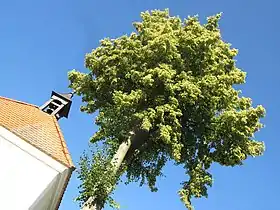Linde
English
Alternative forms
Etymology
Dutch
Etymology
- (Drenthe) First attested as bij der Lynden in 1543. Derived from linde (“linden, Tilia sp.”).
- (Deventer) First attested as in villa dicta linlo in 1290. Perhaps a compound of Proto-Germanic *hlîn- (“Norway maple, Acer platanoides”) and lo (“light forest”). Compare Lent and Lenthe.
- (Twenterand) First attested as dat nye huis to lynne in 1381-1383. Likely derived from Middle Dutch linde (“linden, Tilia sp.”) (see modern linde).
Pronunciation
- IPA(key): /ˈlɪn.də/
Audio (file) - Hyphenation: Lin‧de
- Rhymes: -ɪndə
- Homophone: linde
Proper noun
Linde n
- A village in De Wolden, Drenthe, Netherlands.
- A hamlet in Deventer, Overijssel, Netherlands.
- A hamlet in Twenterand, Overijssel, Netherlands.
References
- van Berkel, Gerard, Samplonius, Kees (2018) Nederlandse plaatsnamen verklaard (in Dutch), Mijnbestseller.nl, →ISBN
German

Eine Linde
Etymology
From Middle High German linde, linte, from Old High German linta, from Proto-West Germanic *lindu.
Pronunciation
- IPA(key): /ˈlɪndə/, [ˈlɪndə]
Audio (file)
Noun
Linde f (genitive Linde, plural Linden)
- linden, lime tree (Tilia gen. et spp.)
- 1844, Heinrich Heine, “Tragödie III”, in Neue Gedichte:
- Auf ihrem Grab da steht eine Linde, / drin pfeifen die Vögel und Abendwinde, / und drunter sitzt, auf dem grünen Platz, / der Müllersknecht mit seinem Schatz.
- (please add an English translation of this quotation)
Declension
This article is issued from Wiktionary. The text is licensed under Creative Commons - Attribution - Sharealike. Additional terms may apply for the media files.